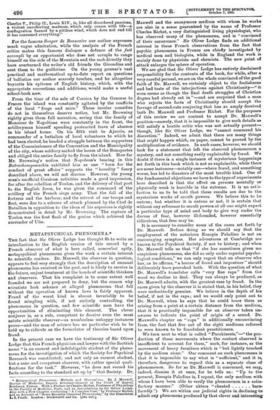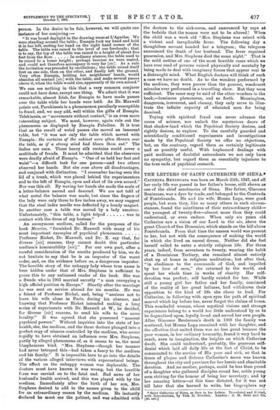accompli by an opportunist who does not scruple to range
himself on the side of the Mountain and the mob directly they have overturned the writer's old friends the Girondins and sent them to the guillotine. On the young gunner's vast practical and mathematical up-to-date report on questions of ballistics our author scarcely touches, and he altogether boycotts his epitome of English history, which, with the appropriate corrections and additions, would make a useful school-book now.
From the time of the sale of Corsica by the Genoese to France the island was constantly agitated by the conflicts of the local "frogs and mice." These insular comedies do not in themselves deserve notice, but Mr. Browning rightly gives them full narration, seeing that the family of Monsieur de Napoleone were constantly in the front, the artilleryman himself spending protracted leave of absence in his island home. On his fifth visit to Ajaccio, as commander of a battalion of local volunteers to which he had been elected, he headed a struggle between the supporters of the Commissioners of the Convention and the Municipality of the city, whose soldiery sacked the house of the Bonapartes and obliged the entire family to fly from the island. How far Mr. Browning's notion that Napoleon's bearing in this Batrachomycmzachia exhibited him as one "born for the conduct of great affairs" supports the " heredity " fancy described above, we will not discuss. However, the young man's unofficial Corsican activities made a good impression, for after the rebellion of Toulon, and the delivery of that port to the English force, he was given the command of the artillery of the French siege army. That the fall of the fortress and the harbour, and the retreat of our troops and fleet, were due to a scheme of attack planned by the Chef de Bataillon in opposition to the ideas of his superiors is rightly demonstrated in detail by Mr. Browning. The capture of Toulon was the first flash of the genius which achieved the surrender of Ulm.
METAPSYCHICAL PHENOMENA.*
THE fact that Sir Oliver Lodge has thought fit to write an introduction to the English version of this record by a French observer of what is here called, somewhat aptly, metapsychical phenomena gives the work a certain interest to scientific readers. Dr. Maxwell, the observer in question, appears to feel very strongly that the description of unusual phenomena has received in the past, and is likely to receive in the future, unjust treatment at the hands of scientific thinkers and observers. That his complaint is to some extent well founded we are not prepared to deny, but the reason why scientists look askance at alleged phenomena that fall without the operation of known laws is fairly apparent. Fraud of the worst kind is almost invariably to be found mingling with, if not entirely controlling, the phenomena in question, and few scientific men have the opportunities of eliminating this element. The clever conjurer is, as a rule, competent to deceive even the most astute scientific observer—as numberless unhappy instances prove—and the man of science has no particular wish to be held up to ridicule as the formulator of theories based upon fraud.
In the present case we have the testimony of Sir Oliver Lodge that this French physician and lawyer with the Scottish name "is an earnest and indefatigable student of the pheno- mena for the investigation of which the Society for Psychical Research was constituted; and not only an earnest student, but a sane and competent observer, with rather special quali- fications for the task." However, "he does not record his facts according to the standard set up by" that Society. Dr,
• Metapsychical Phenomena: Methods and Obsertxttions. By J. Maxwell, Doctor of Medicine, Deputy Attorney-General at the Court of Appeal, Bordeaux, Prance. With a Preface by Charles Richet. Professor of Physiology In the Faculty of Medicine, Paris, and an Introduction by Sir Oliver Lodge. Also with a New Chapter, containing" A Complex Case," by Professor Richet, and an Account of "Some Recently Observed Phenomena," by the Translator, Its I. Finch. London Duckworth and Co. 1105. Deg
Charles Richet, a very distinguished living physiologist, who has observed many of the phenomena, and is "convinced of their occurrence." Sir Oliver Lodge finds an additional interest in these French observations from the fact that psychic phenomena in France are chiefly investigated 'by medical men and biologists, while in England the work is mainly done by physicists and chemists. The new point of attack enlarges the sphere of operation.
We are glad that Sir Oliver Lodge has entirely disclaimed responsibility for the contents of the book, for while, after a very careful perusal, we are on the whole convinced of the good faith of Dr. Maxwell, we certainly object to the foolishness and bad taste of the interjections against Christianity—" it even seems as though the final death struggles of Christian dogma had already set in "—and are surprised that a man who rejects the facts of Christianity should accept the farrago of second-rate conjuring that has so amply deceived both Dr. Maxwell and Professor Richet. For the purposes of this review we are content to accept Dr. Maxwell's position—namely, that it is impossible to give such details as will satisfy a hostile critic who was not actually present— though, like Sir Oliver Lodge, we "cannot commend his discretion." Indeed, we admit that there are many things that might happen which, on paper, cannot he proved by the multiplication of evidence. In such cases, however, we should look for a statement that left the observed phenomenon a mystery, and not something easily explainable by fraud. We doubt if there is a single instance of mysterious happenings set forth in this book which is not so explainable, while there are some instances—notably one—where fraud, and something worse, has led to disasters of the most terrible kind. One of the fundamental objections we have to the type of experiments here described is that the effect on persons mentally or physically weak is horrible in the extreme. It is no satis- faction to us to be told that these results are due to the mysterious works of occult powers. We believe this to be untrue ; but whether it is untrue or not, it is certain that without any reference to occult powers at all one might expect a particular type of mind and body to give way under the duress of fear, however ill-founded, however essentially ridiculous, that fear may be.
It is necessary to consider some of the cases set forth by Dr. Maxwell. Before doing so we should say that the employment of the notorious Eusapia Paladino is not an encouraging symptom. Her adventures at Cambridge are known to the Psychical Society, if not to history ; and when Dr. Maxwell tells us that "if she has sometimes given me suspicious phenomena, she did so only under especial psycho- logical conditions," we can only regret that an observer who has, as he affirms, "a horror of fraud and imposture" should deliberately have provoked both. With the question of what Dr. Maxwell's translator calls "very fine raps" from the wood we decline to deal. They can always be produced, as Dr. Maxwell admits, with the greatest ease by fraud. In the cases given by the observer it is stated that, in his belief, they were undoubtedly genuine. We believe in the depth of his belief, if not in the raps ; and we would only point out to Dr. Maxwell, when he says that be could trace them as arising from a point at a certain distance from the medium, that it is practically impossible for an observer taken un- awares to indicate the point of origin of a sound. Dr. Maxwell's chapter on " raps " is additionally unconvincing from the fact that five out of the eight mediums referred to were known to be fraudulent practitioners.
We turn next to what is called "Parakinesis,"—" the pro- duction of those movements where the contact observed is insufficient to account for them," such, for instance, as the movement of heavy furniture which is "but lightly touched by the medium alone." Our comment on such phenomena is that it is impossible to say what is "sufficient," and it is, therefore, dangerous to regard this as a separate class of phenomenon. So far as Dr. Maxwell is concerned, we may, indeed, dismiss it at once, for he tells us : "Up to the present, Eusapia Paladino is, I repeat, the only medium with whom I have been able to verify the phenomenon in a satis-
factory manner." (Other sitters "cheated bare- facedly.") We are within our judicial rights in declining to admit any phenomena produced by that clever and interesting
Person. In the desire to be fair, however, we will quote one instance of her conjuring:— . " It was broad daylight in the drawing room at L'Agnelas. We Were standing around the table ; Eusapia took my hand and held it in her left, resting her hand on the right hand corner of the table. The table was raised to the level of our foreheads ; that is to say, the top of the table was raised to a height of about five feet from the floor In ordinary seances, the table used to be raised to a lesser height ; perhaps because we were seated, and could not therefore accompany it very far [sic]. As a rule the levitation was preceded by oscillations ; the table raised itself first on one side, then on the other, and finally left the ground. Very often Eusapia, holding her neighbours' hands, would abandon all contact [sic] with the table, and make several passes above it, when the table would rise, apparently of its own accord."
We can see nothing in this that a very common conjurer could not have done, except one thing. We admit that it was
remarkable, almost Irish, for Eusapia to have made passes over the table while her hands were held. As Dr. Maxwell
points out, Parakinesis is a phenomenon peculiarly susceptible to fraud, and, we may add, well within the gifts of Eusapia.



























































 Previous page
Previous page